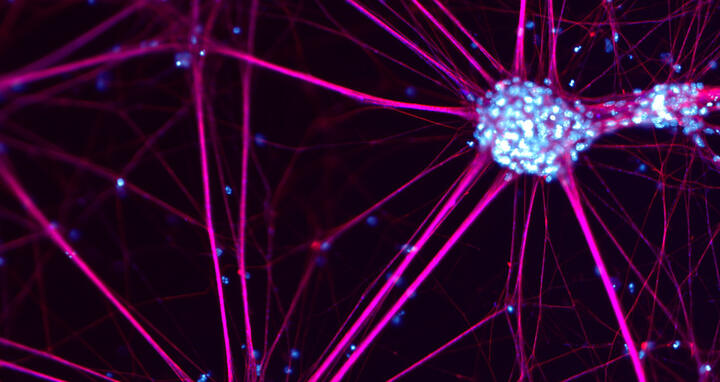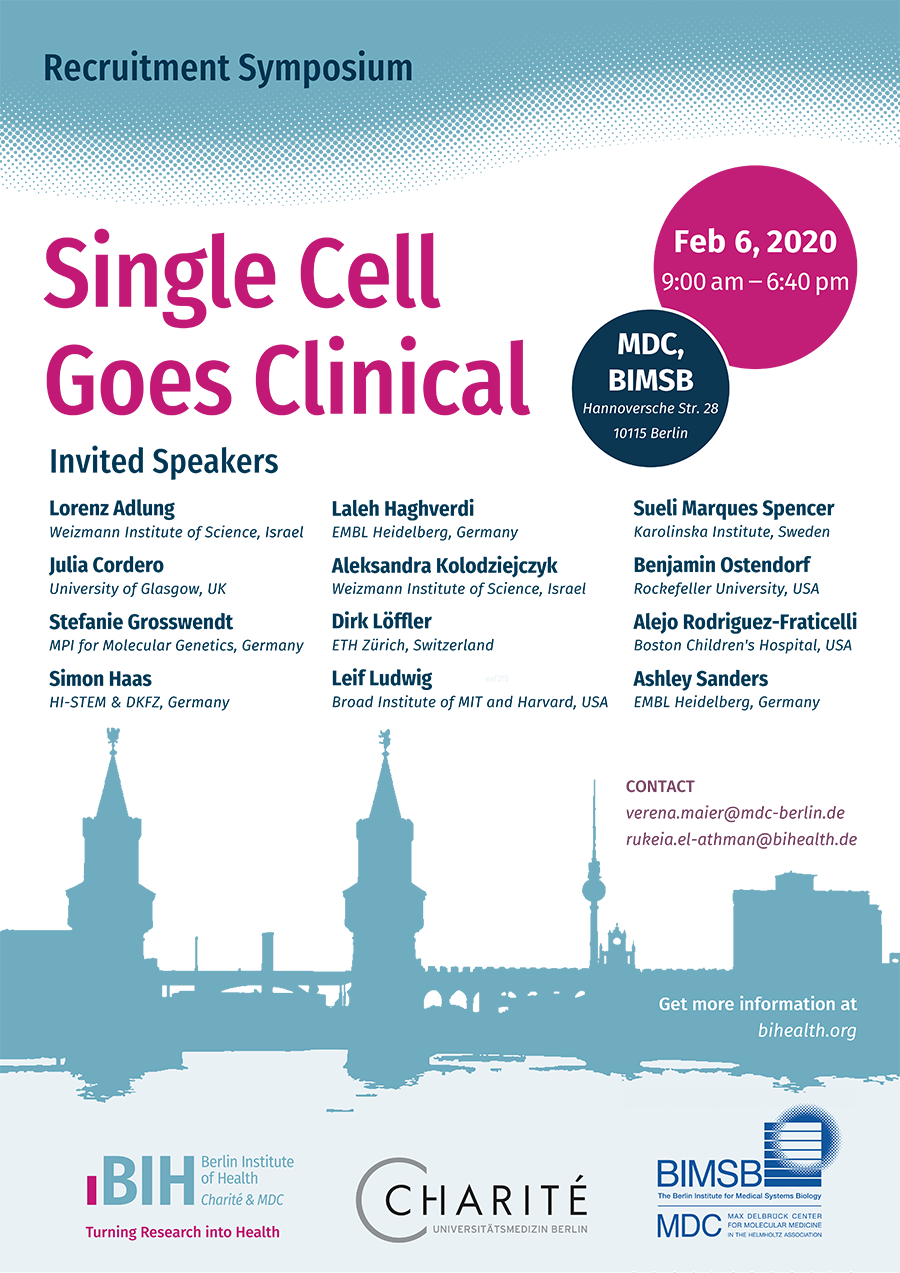BIH, MDC und Charité launch a new research focus
In 2018, the journal Science named new technologies that can be used to analyze individual body cells its “Breakthrough of the Year.” For the first time it was possible to break down entire organs, tumors, even entire insect larvae into individual cells, measure their gene activity, and – with the help of high-performance computers and artificial intelligence – reassemble these individual cell analyses to form the entire organ or organism. This breakthrough was made possible in part by research conducted at BIMSB. “It was as if we had invented a super microscope with which we could suddenly look inside every cell in a tissue, all the cells at once, and see what was going on at the molecular level inside the cell – for example, when and why it gets sick,” explains Professor Nikolaus Rajewsky, Scientific Director of the Berlin Institute for Medical Systems Biology (BIMSB) at the Max Delbrück Center for Molecular Medicine in the Helmholtz Association (MDC), and spokesperson for the BIH’s new focus area “Single Cell Technologies for Personalized Medicine.”
State-of-the-art technologies for clinical use
I consider this initiative to be the beginning of a ‘Cell Hospital,’ in which the basic research of the MDC/BIMSB, the clinical research of Charité, and the translational research of the BIH are brought together.
At the core of the new focus area are three new, internationally appointed junior research groups. They will study various diseases at the level of individual cells in order to systematically characterize them at the molecular level and to develop new methods to better diagnose and treat these diseases. The junior research groups will be located at BIMSB, and thus in close proximity to Charité’s Berlin-Mitte campus. At BIMSB, they will have access to the latest single cell methods and systems biology expertise. Each junior research group will also work closely with a clinician at Charité, helping to develop single cell technologies for specific medical issues and clinical application. “I therefore consider this initiative to be the beginning of a ‘Cell Hospital,’ in which the basic research of the MDC/BIMSB, the clinical research of Charité, and the translational research of the BIH are brought together,” explains Rajewsky. “The idea is not only to understand the mechanisms that cause cells to become diseased, but also to discover these cells early enough to restore them to health before a disease takes such a hold that it can only be treated with great difficulty – or invasively and expensively.”
BIMSB is a part of MDC and located in Berlin-Mitte.
Following a highly competitive recruitment process, twelve applicants for the junior group leader positions have been invited to a public symposium held in Berlin on February 6, 2020, to present their previous scientific work in the field of single cell biology and their ideas for its clinical application. These scientists come from some of the world’s leading institutions in the United States, Israel, Sweden, the United Kingdom, Switzerland and Germany. The selection committee includes BIMSB research group leaders and hospital directors from Charité who have expressed interest in the new focus area. Among them are representatives from oncology, neurology, infectious diseases, cardiovascular diseases and rare diseases. Professor Axel R. Pries, Dean of Charité - Universitätsmedizin and interim Chairman of the BIH Executive Board, explains: “The selection criteria include scientific excellence, the ability to fit into a clinical setting, and the potential to transfer research results into clinical application.”
Significant progress expected
The recruitment symposium marks the scientific kick-off for the work of the BIH and MDC’s new focus area “Single Cell Technologies for Personalized Medicine.” Nikolaus Rajewsky is confident about the future: “I am sure that we will make significant progress – not for all, of course, but for some diseases. This new focus area allows a bridge to be built, and thus translation to be achieved, between basic research and the clinic. The immediate proximity of BIMSB/MDC, Charité and BIH will enable a great deal of innovation and long-term progress for patients.”
Further informationen
Tracking down development cell by cell is "Breakthrough of the year"
Über das Symposium "Single Cell goes Clinical"
The Berlin Institute of Health (BIH)
The Berlin Institute of Health (BIH) is a biomedical research institution focusing on translational research and precision medicine. The BIH is dedicated to improving the prediction in progressive diseases and developing advanced therapies for unmet medical needs in order to improve patients’ health and quality of life. The Institute is committed to providing research solutions and innovation enabling value-based, personalized healthcare. The BIH is funded 90% by the Federal Ministry of Education and Research (BMBF) and 10% by the State of Berlin. The two founding institutions, Charité – Universitätsmedizin Berlin and Max Delbrück Center for Molecular Medicine in the Helmholtz Association (MDC), are independent, member entities within the BIH.
- The Max Delbrück Center for Molecular Medicine (MDC)
-
The Max Delbrück Center for Molecular Medicine in the Helmholtz Association (MDC) is one of the world’s leading biomedical research institutions. Max Delbrück, a Berlin native, was a Nobel laureate and one of the founders of molecular biology. At the MDC’s locations in Berlin-Buch and Mitte, researchers from some 60 countries analyze the human system – investigating the biological foundations of life from its most elementary building blocks to systems-wide mechanisms. By understanding what regulates or disrupts the dynamic equilibrium in a cell, an organ, or the entire body, we can prevent diseases, diagnose them earlier, and stop their progression with tailored therapies. Patients should benefit as soon as possible from basic research discoveries. The MDC therefore supports spin-off creation and participates in collaborative networks. It works in close partnership with Charité – Universitätsmedizin Berlin in the jointly run Experimental and Clinical Research Center (ECRC), the Berlin Institute of Health (BIH) at Charité, and the German Center for Cardiovascular Research (DZHK). Founded in 1992, the MDC today employs 1,600 people and is funded 90 percent by the German federal government and 10 percent by the State of Berlin.
Charité – Universitätsmedizin Berlin
Charité – Universitätsmedizin Berlin is one of the largest university hospitals in Europe, boasting 3,099 beds and approximately 100 departments and institutes spread across 4 separate campuses. At Charité, the areas of research, teaching and medical care are closely interlinked. With a total of 20,921 members of staff employed across its group of companies (17,615 of which at Charité), the organization is one of the largest employers in Berlin. 5,047 of its employees work in the field of nursing, with a further 4,988 in research and medical care. Last year, Charité treated 123,793 in- and day case patients, in addition to 682,731 outpatients. In 2021, Charité recorded a turnover of approximately € 2.3 billion (including external funding and investment grants) and set a new record by securing more than € 215.8 million in external funding. Charité’s Medical Faculty is one of the largest in Germany, educating and training more than 9,000 students across the subjects of medicine, dentistry, health sciences and nursing. Charité also offers 730 training positions across 11 different health care professions, in addition to 111 training positions in a further 8 professions. Within the field of academic medicine, Charité’s priorities are highlighted by its main areas of research focus: infection; inflammation and immunity including COVID-19 research; cardiovascular research and metabolism; neuroscience; oncology; regenerative therapies; and rare diseases and genetics. Examples of the work conducted by Charité researchers include involvement in 28 DFG Collaborative Research Centers (of which seven are led by Charité), three Clusters of Excellence (of which one is led by Charité), 10 Emmy Noether Independent Junior Research Groups, 14 European Research Council grants and 8 European collaborative projects (coordinated by Charité).
As of June 1, 2022
Contacts
Dr. Stefanie Seltmann
Head of Communications and Marketing
+49 (0) 30 450 543019
s.seltmann@bihealth.de
Christina Anders
Editor, Communications Department
Max Delbrück Center for Molecular Medicine (MDC)
+49 (0) 30 940 62118
christina.anders@mdc-berlin.de oder presse@mdc-berlin.de
Manuela Zingl
Head of Corporate Communications and Corporate Spokesperson
Charité – Universitätsmedizin Berlin
+49 30 450 570 400
presse@charite.de







